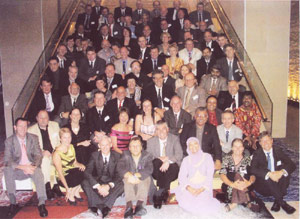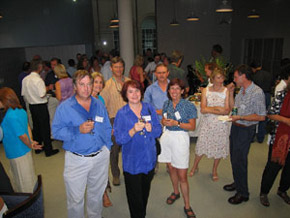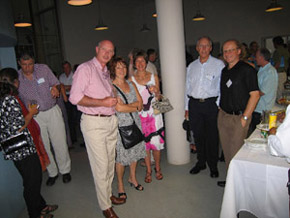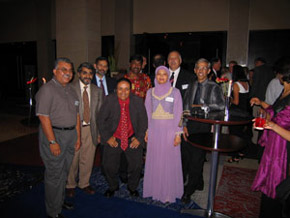Reunion roundup
Reunions held in 2004: Class of 1979
3 - 5 December 2004
A summary by Derek Solomon

Marion Absolom, John Anthony, Martin Bailey, Jean Bassett, Steve Blanckenberg, Bones Bonellie, Zea Borok, Neil Br aude, Omar Brey, Dilshaad Brink, Abdul Cariem, Gary Chaimowitz, Mark Cotton, Kevin Crombie, Keith Cronwright, Sid Davis, Andrew du Toit, David Espen, Paul Gebers, Michael Gold, Dennis Goodman, Liz Gwyther, Paul Hayse-Gregson, Xa Heywood, Dirk Hoffman, Robert Honeth, Don Hudson, Chris Hugo-Hamman, An thony Human, Allie Jardine, Larry Jee, Gareth Jones, Charlie Keen, Richard Keys, Sharon Kling, Patricia Knox, Peter Koll, Anton Kruger, Philip Levine, Joan Lewis, Lucy Linley, Wayne Mackintosh, Bruce Mathew, Rodger Meyer, Anton Miller, Charlie Miller, Rory Mulligan, Greg Musson, Achmat Nackerdien, C hris Narramore, Judith Norman, David Nye, Nicky Padayachee, Martyn Payne, Linda Hering, Martin Richardson, Elizabeth Robinson, Bertie Saunderson, Richard Scheffer, Derek Solomon, Neil Solomons, Athol Stanford, Janet Stanford, Bruce Starke, Rob Stein, Krisela Steyn, John Strachan, Alan Szeftel, Steve n Velkes, Tineke Vermaat, Tony Westwood, Mark Whistler, Paul Whitaker, Dave Whitelaw, Greg Whittaker, Ingrid Williams, Sinclair Wynchank, Michelle Youngleson, Noel Ziady
(Click on the image to see a large version.)
Academic Meeting Programme
- Aboriginal Psychiatric Serviice Provision to the James Bay Cree - Gary Chaimowitz
- Scuba Diving Accidents - Bruce Mathew
- Chronic Diseases of Lifestyle in South Africa - Krisela Steyn
- South Africa Leads the (Developing) World in Tele Medicine - Sinclair Wynchank
- The Development of Palliative Medicine in South Africa - Liz Gwyther
- Homeopathy - David Nye
- Resolving Medical Ethical Dilemmas - Sharon Kling
- The Impaired Practitioner - Rodger Meyer
- Fiddling Around in the Sewage (non medical but research Orientated) - Dave Whitelaw
- Vitamins and Your Heart - Dennis Goodman
- How we have Changed - Sidney Davis
- Emerging Computer Technologies and their Application to Medicine - Kevin Crombie
Early in 2004 a committee consisting of Martin Bailey, Omar Brey, Andrew Du Toit, Chris Hugo-Hamman and Derek Solomon got together and decided that 25 years was a good time to re-acquaint ourselves with old classmates. It was our mission to reach as many as we could and, in conjunction with the tenacious Joan Tuff of the alumni office, we plundered the available e-mail addresses. Persistence paid off and finally a record of 80 alumni had the joy of attending what turned out to be a memorable weekend. The weather was gorgeous, the Cape Doctor was put to bed and Cape Town was at its best.
Sunrise on Friday 3 December saw a group of golfers tee off at Royal Cape. Alan Szeftel was obviously too busy studying and dating rag queens at varsity to exhibit his golfing talents then. Today he is a +1 handicap living in Los Angeles and doing Respiratory Medicine as a hobby in his spare time. Due to the heat of the day a degree of thirst quenching was necessary which precluded most of the golfers from attending the afternoon's events.
The excitement and anticipation at registration was palpable, people were generally happy to see one other and there was a sense of warmth and kinship that prevailed throughout the weekend.
The rest of Friday afternoon was spent doing the customary tour of the medical school, including the new Student Learning Centre, library and the transplant museum. Those of us who were a little distrusting of the new medical curriculum were pleasantly surprised by the enthusiastic Laurie Kellaway who reassured us that a computer assisted, group discussion approach to medical problem solving was in line with international trends in medical tuition. We were however all grateful that we had had the opportunity to learn our craft under the watchful eye and personal guidance of some very experienced wise old owls.

|

|

|

|

|

|
After a few drinks at the Mac Club we crossed over to the cocktail party in the new Institute of Infectious Diseases and Molecular Medicine building where the golfers resurfaced and many more locals arrived. The din of excited chatter and smiles on people's faces said it all. We were fortunate that the Dean of Medicine, Nicky Padayachee, a 1979 classmate, addressed us that evening, expanding on the changes in curriculum, transformation in admissions policies and developments at medical school in general. How times have changed! In our day, transformation was what happened to Jean Basset's figure between second and third year.
On Saturday morning we had a nostalgic return to lectures in the old but revamped Anatomy building. Andy (Billy Crystal) du Toit and Martin (Johnny Carsen) Bailey chaired a wide range of funny and fascinating presentations from the likes of Gary Chaimowitz, Bruce Matthew, Krisela Steyn, Sinclair Wynchank, Liz Gwyther, David Nye, Sharon Kling, Dave Whitelaw, Dennis Goodman and Sydney Davis. Roger Meyer's talk on "The Impaired Practionerwas a brilliant and honest reflection of his own personal journey and experiences with substance abuse and we all felt humbled and privileged that he shared it with us. Time was limited, Dirk Hoffman was unable to give his talk on family planning in the female residences of UCT and Dennis Goodman had to be dragged off the podium. True to 1979 form, Noel Ziady arrived late and Bones Bonellie fell asleep after tea.
Dinner on Saturday evening took place at the Arabella Sheraton on the Foreshore. The evening was enhanced by the background music of a local oil-can guitarist who usually busks at the Waterfront. Gareth Jones thrived during the class photo which was basically a scrum on the staircase. The speech by Chris Hugo-Hamman was brilliant and it is included in this issue. After dinner several adjourned to the patio for a late night-cap and a few puffs of traditional Chris Narramore cigars.
Sunday, another perfect Cape Town morning, was spent at Kirstenbosch. After an interesting guided tour of the gardens, exchanging stories and taking photographs, we had a lovely light lunch in the restaurant. It was then time to say goodbye, to reflect on what had indeed been an awesome weekend, to make plans to keep in touch and to look forward to our next opportunity to all get together again.
It is not easy to sum up the meaning of a reunion and I feel this is best done by sharing some of the responses and letters I received.
"The Class of 1979 Reunion brought all of us the warmth of camaraderie and pleasure of shared memories relived. This reunion attracted a record number of participants indicating that there was something special about our class and the individuals in it. I would like to thank everyone for the friendship I experienced and the time we spent together over the last three days. I hope it will not be another 25 years before we gather again." - Kevin Crombie
"It was great reminiscing with those old friends who used to go to all the lectures while we happily played golf - and then had the cheek to get their notes. Noel Ziady will remember his hole-in-one at Mowbray being witnessed by the Professor of orthopaedics at 11h00 on a Monday morning!" - Bones Bonellie
"I do believe our class was exceptional in many ways. The past weekend's reunion proved that." - Allie Jardine
"I was personally going through a difficult time ... going to medical school and my four little boys kept me sane, hopeful and believing in the future. This weekend made me understand why." - Krisela Steyn
"This was one of the most meaningful and memorable weekends of my life." - Zea Borok
"The weekend proved to be an amazing blast from the past - exceeding all my expectations. The tangible warmth was very special and the striking thing to me was that so many, if not all, of us have a story of some kind of blow dealt to us in the course of life; some overwhelming. Yet there was a huge sense of enriched survival overall. A massive, more complex 'big chill' ... and to those who missed it, from one who thought at first 'Do I really want to go?', for heaven's sake, come next time; it will be wonderful to see you. I now know!" - Lucy Linley
To any other alumni who may read this report; if you have the opportunity to attend a class reunion all I can say is, don't miss it for the world!
Finally, a huge thanks must go to Joan Tuff for her dedicated and enthusiastic role in organizing this special weekend.
Speech at Reunion dinner by Chris Hugo Hamman
- 10 years of democracy
- 25 years since graduation
- 175 years of the university
My friends and colleagues
In your distinguished company I am greatly honoured that Derek Solomon's asked me to address you all tonight. I am not going to lead you in song but will try to pull things together and contextualise our reunion. You will all have an opportunity to speak later on so I urge you not to speak while I am busy! Sinclair Wynchank declared boldly this morning that he was not the oldest in our class. I would just like to remind the highly perceptive and still gorgeous Jean Bassett, from the River Club nog al, that I am neither of the two older persons to whom he referred! God bless the candour and honesty of classmates. Furthermore, when David Nye politely noted how well we looked because he was expecting us all to be bald and fat, he was not looking at Steve Velkes or I!
So here we are at 25 years and what an extraordinary last 25 hours it has been. On behalf of the organizing committee, Martin Bailey, Omar Brey, Andrew du Toit and Derek Solomons, a very generous welcome to all of you back to UCT, back to Cape Town and back to South Africa. We celebrate this significant milestone in our lives and I am happy to do that. I am dwarfed by the reality that in this year we remember also that our university is 175 years old. A university which has educated generations of South Africans. For me a phenomenon beginning with my grandfather in 1898 and extending through my uncle and father, three siblings, three nieces and next year, probably 2 of my three daughters. That is a rich heritage, which I know many of you share. Barnard Fuller, a familiar name to any student of UCT Medical History, was my wife's great, great uncle. In his presidential address to the Medical Association in 1907, EB, as he was known, once again made an impassioned plea for the establishment of a medical school in Cape Town and ended his speech with these words;
"Looking on into the future, however, I see before me as in a vision a great teaching University arising under the shadow of old Table Mountain and a part of that University is composed of a well equipped medical faculty. I say I see these things as in a vision, for you, and I may never behold it with my own eyes."
As Time magazine recognised in 1974, the year we began together, that vision became a reality. We took much of this for granted when we were at UCT but with the benefit of time, travel and experience, this community of high achievers has grown to recognise and appreciate the extraordinary privilege we enjoyed here, the high standard of our training and the excellence of our institution.
But simultaneously, none of this means much when we recognise that there is an event this year of even greater significance. We are able today to celebrate together 10 years of peace and democracy in our country. A non-racial South Africa as I wanted to know it, the country which is mine and the nation which makes me proud - 10 years old. Nkosi Sikelela I'Afrika.
As Sid Davis noted this morning, the differences between 2004 and 1979 are stark. We studied medicine in an era free of the scourge of HIV and AIDS. We were educated in an age without the PC indeed how many of us could type? How many would have thought they might some day wish to keyboard? The fax machine arrived 6 years after we had finished at this university. Without the internet or e mail and without the mobile phone. Text messages are referred to in South Africa as an SMS. For us SMS was something Dirk Hoffman did at night in med res! We only received real television in 1976 and our highlights were Dallas, Wimbledon, intervarsity and the test channel!
Let me remind you a little more about 1979 because whilst 170 graduated MBChB at UCT, from Absalom through Ziady, there were some other notable events.
It was a time of change in some countries. On January 16 the Shah fled Iran, and on February 1 Ayatollah Khomeini made a victorious return from 14 years in exile. The occupation of the US Embassy was to follow in November and last a year. In Britain the Labour Government fell, in May the Conservative Party won the election and Margaret Thatcher became the first women Prime Minister of Great Britain. Anthony Blunt, the fourth man, was recognised with his fellow traitors Burgess, Mclean and Philby, and was stripped of his peerage.
There were events of great horror. The invading Vietnamese discovered the mass graves of the Pol Pot regime and on August 19 Pot was sentenced to death. Zulfikar Ali Bhutto, deposed Premier of Pakistan, was hanged on April 4. Thankfully Idi Amin fled Uganda. Airey Neave was killed in London in the House of Commons. On August 27 Earl Mountbatten of Burma was killed, also by the IRA, in Mullaghmore, Ireland. India, of which he was the last Viceroy, declared a week of national mourning.
It was also a time for peace. Jimmy Carter was President of the USA and busy signing treaties. On March 26 between Israel and Egypt, and on June 18 the SALT 2 treaty with the Soviet Union. Two treaties which still hold today. Mother Theresa was awarded the Nobel peace prize. Rhodesian whites voted for black rule. After a transition period under the very Abel Muzorewa, on December 21, after 14 years of illegal independence, Robert Mugabe, Joshua Nkomo and Bishop Muzorewa signed the Lancaster House Agreement, there was a ceasefire, new elections were called, sanctions lifted and Rhodesia became Zimbabwe.
It was also a time for war and soon after we became doctors, on December 27, the Soviet Union invaded Afghanistan and the US started its support of the Taliban and other resistance movements.
What of health? On March 31 an explosion of hydrogen gas crippled the reactor at Three Mile Island. Shortly thereafter Derek Yach and Michael Kantey started the Anti Koeberg Campaign here in Cape Town. Godfrey Hounsfield and Allan Cormack shared the Nobel Prize for their invention of the EMI CAT scanner. Cormack of course was born in Johannesburg and graduated MSc from UCT in 1945. In the same year, two years after the last known case of naturally transmitted smallpox was reported, the WHO declared its campaign a success and to date, smallpox is the only disease that has been completely eradicated through public health efforts.
In South Africa, most languished misery and Nationalist oppression was only gaining a serious momentum. There were lighter moments provided for us by those in high office. "Muldergaterocked and shocked our country. After initial allegations of misdirection of funds to finance clandestine activities, PW Botha had already succeeded BJ Vorster as Prime Minister, in December 1978. The first casualties of '79 were Cornelius "ConnieP. Mulder, Minister of Information, and Eschel M. Rhoodie, his Department Secretary. Mulder was expelled by the National Party (I did not think that possible!) and charged with contempt of court. Then on June 4, on the day that the Erasmus commission accused him of giving false testimony, Balthazar Johannes Vorster resigned as president of South Africa. The name of his successor, Marais Viljoen, will remain a handsome challenge for all participants in the local production of the board game "trivial pursuit.
Finally on 1979, who remembers the number 1 single in the UK that year, Art Garfunkle's Bright eyes? I hear him now.
Tonight, whilst we celebrate the presence of 80 of our class mates and about 50 of their partners, we lament the absence of another 80 who were sadly unwilling or unable to join us. I have personally received messages and bring you greetings from Maxwell Michael, Deon Venter, Bruce Adnams, Angelo Grazziolli, Andrew Smith, Gordon Haddow and my best friend Derek Yach - who last year capped an astonishingly successful career in Public Health by with his wife Yasmin, having his first child, a son Julian. More particularly, we remember quietly those few who could never be with us. Steve Harle, Creswell Smith, Chris Dare, Mike le Grange and my old school friend Stanley Newman. But I feel them here tonight, Chris Dare walking her dog, (the only animal to graduate MBChB UCT) and a slightly dishevelled Mike le Grange, just having a fag!
So who are you and what's happened to you? Let me save you some math. 82 (47%) of us live in South Africa, only 49 of whom trained for the greater Cape Town. Of those 82 in South Africa, 60 are specialists, 22 preferring general practice. My reading tells me that there are 9 Paediatricians, 5 Orthopods and 4 Anaesthetists. Three more Paediatricians overseas places us in an unassailable position! There was truly a diaspora. UK 18, USA 17, Canada 14 and Australia 11, NZ 8. The rest of Africa was not well served. Only 1 of us lives in Namibia and only 1 of us returned to Zimbabwe. It is a pity that half of us are not in the country but it is nothing new. My father graduated in 1954 and his class was similarly diasporate within a decade. Sadly, still we read that despite the glory of our democracy, the demographic changes in the student body and punitive measures designed to keep our young graduates here, the figures remain the same and it is only the reasons for leaving that seem to change.
No event of this nature is held without great effort and two persons deserve special thanks. Joan Tuff is the UCT Alumni officer responsible for all the medical reunions. She has refined the programme to perfection and this well oiled machine is apparently faultless. However, that does not diminish the fact that she has worked tirelessly for over a year so that we could all be here tonight, debts paid! Derek Solomon's has applied the same efficiency and effectiveness to this reunion as he has in his professional life. He too has laboured hard on our behalf and deserves our warmest thanks and appreciation.
Finally, what of me? I am still just an aspiring rock star! I am happy to be able to live with my family, in this beautiful city. I had a wonderful 6 years at UCT and many of you here tonight helped make that a happy and fulfilling time for me. I have only had two car accidents in my driving life. Both of them whilst at UCT - both of them on university premises! The first, a head on collision into Catherine King outside the Physiology building was after miraculously passing second year. The second, into the back of Richard Keys, whilst leaving our last lecture the morning of our farewell dinner at the Holiday Inn. His fault! I have only two regrets. Firstly, that I was not the most diligent student but then the university offered so many tantalizing extra curricular activities and I drank heavily at many of those fountains. And yes that includes the Pig and Whistle. Secondly, that I did not get to know more of my class mates a whole lot better. I was inspired this morning by the diversity of your experience and the passion with which you continue to apply your skills in your careers. I was playing golf with Allan Seftel on Friday morning. I should correct that, he was playing the golf and I was occasionally making contact with a white ball. We had a fabulous outing with 6 others. We had many moments of reflection on these special 6 years which he succinctly paraphrased thus. "Those were the best years of my life.
I agree. A toast to you all and a toast to UCT.